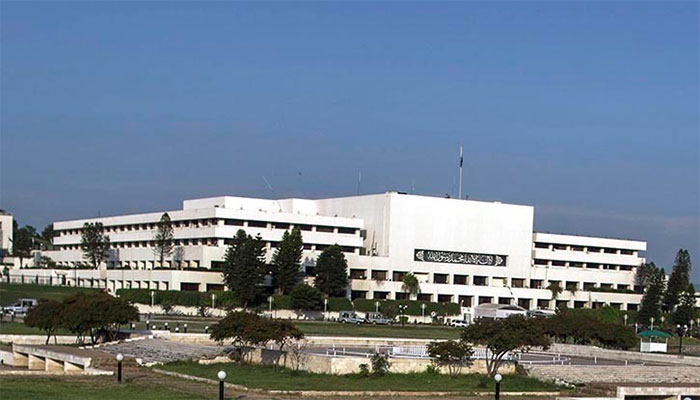NA panel passes amendment bill: Two years in jail, Rs500,000 fine for mocking Pak forces
Submitted by PTI lawmaker Amjad Ali Khan, the bill was approved by a majority. The chairperson of the standing committee, Raja Khurram Shahzad Nawaz, broke the 5-5 vote tie by voting in favour of the proposed bill.
ISLAMABAD: Critics of the Pakistan armed forces now face two years in jail as well as fines worth up to Rs500,000, as per a new criminal law amendment bill passed Wednesday by the National Assembly Standing Committee on Interior.
Submitted by PTI lawmaker Amjad Ali Khan, the bill was approved by a majority. The chairperson of the standing committee, Raja Khurram Shahzad Nawaz, broke the 5-5 vote tie by voting in favour of the proposed bill.
PPP leader Syed Agha Rafiullah, as well as the PML-N’s Marriyum Aurangzeb and Chaudhry Nadeem Abbas Rebaira, argued against the bill, saying it would be used against freedom of
expression in Pakistan.
The Khyber Pakhtunkhwa government has voted against the bill even though the remaining three provinces were yet to express their views on it, they argued. "It is against our own institutions [and] we stand strong with our institutions.
"However, criticism in good faith should not be misunderstood. Why are they being made sacred cows," they argued further. Under the criminal law amendment bill, Pakistan's armed forces and their personnel would be free from any deliberate ridicule, insult, and defamation. Those who do so would be punishable under Section 500A of the Pakistan Penal Code (PPC), with punishment including jail time of two years, a fine of up to Rs500,000 or both.
Furthermore, critics of the Pakistani armed forces would face trial in a civil court, according to the criminal law amendment bill.
-
 Gigi Hadid Feels 'humiliated' After Zayn Malik's 'pathetic' Comment: Source
Gigi Hadid Feels 'humiliated' After Zayn Malik's 'pathetic' Comment: Source -
 Olympics Men Hockey Game: McDavid, Crosby Power Canada Past Czechia
Olympics Men Hockey Game: McDavid, Crosby Power Canada Past Czechia -
 Sony PlayStation State Of Play Reveals 'Castlevania' And 'Metal Gear' Return
Sony PlayStation State Of Play Reveals 'Castlevania' And 'Metal Gear' Return -
 Ontario Tuition Freeze Ends, Allowing Colleges And Universities To Raise Fees
Ontario Tuition Freeze Ends, Allowing Colleges And Universities To Raise Fees -
 King Charles Should Apologise To All Rape Victims, Says New Poll
King Charles Should Apologise To All Rape Victims, Says New Poll -
 Cardi B Shares Emotional Message Amid Stefon Diggs Split Rumors
Cardi B Shares Emotional Message Amid Stefon Diggs Split Rumors -
 James Van Der Beek’s 'heartbroken' Ex Wife Breaks Silence Of His Death
James Van Der Beek’s 'heartbroken' Ex Wife Breaks Silence Of His Death -
 Sarah Ferguson, Shamed Andrew Spotted In ‘family Costume Drama’
Sarah Ferguson, Shamed Andrew Spotted In ‘family Costume Drama’ -
 Kylie Kelce Reveals Why She Barely Planned Her Wedding Day?
Kylie Kelce Reveals Why She Barely Planned Her Wedding Day? -
 Why Shamed Andrew Called His Victims ‘Mrs Windsor’
Why Shamed Andrew Called His Victims ‘Mrs Windsor’ -
 Kate Hudson Explains Why Acting Isn't Discussed At Home
Kate Hudson Explains Why Acting Isn't Discussed At Home -
 Prince William, Kate Middleton Epstein Statement Was AI Generated, Says Expert
Prince William, Kate Middleton Epstein Statement Was AI Generated, Says Expert -
 Sarah Ferguson On Her Way To Hurt 'only Two People Who Care About Her'
Sarah Ferguson On Her Way To Hurt 'only Two People Who Care About Her' -
 World’s Top PC Maker Sounds Alarm Over Memory Chip Shortage
World’s Top PC Maker Sounds Alarm Over Memory Chip Shortage -
 King Charles Is ‘clearly Worried’ Andrew Has Tarnished Royal Image
King Charles Is ‘clearly Worried’ Andrew Has Tarnished Royal Image -
 Royal Family Loses 'loyal' Worker After King Charles Disliked His Work?
Royal Family Loses 'loyal' Worker After King Charles Disliked His Work?




